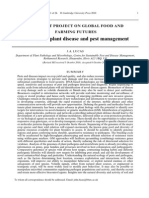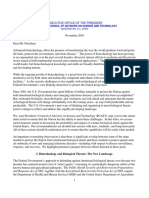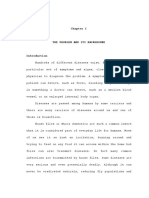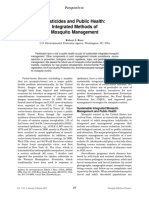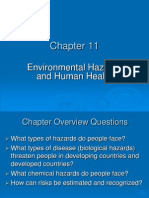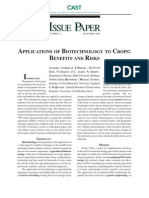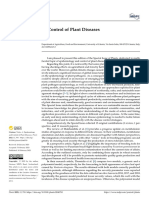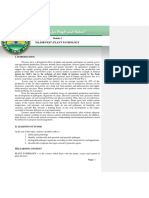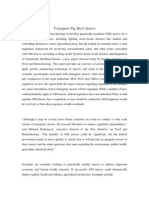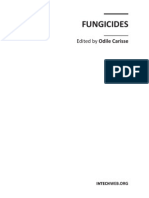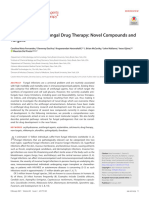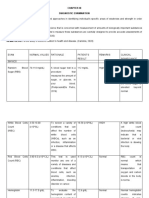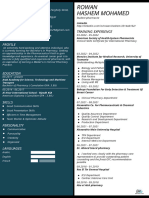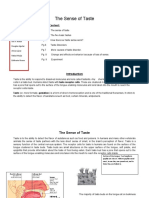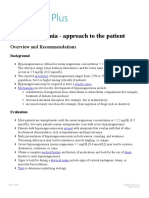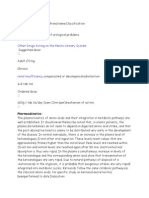0 ratings0% found this document useful (0 votes)
33 viewsDumenyo - Research Impact Statement PDF
Dumenyo - Research Impact Statement PDF
Uploaded by
Ethan CurtisDr. Korsi Dumenyo is conducting research on bacterial soft rot/blackleg and bacterial wilt, two important plant diseases that infect over 100 crop species and cause billions in losses annually. The goal is to gain a detailed understanding of how these pathogens cause disease in order to design effective management strategies. His research involves characterizing the pathogen and host interactions at the molecular level using modern tools to identify disease-causing genes in the pathogens and vulnerable plant components. This work has the potential to reduce crop losses and improve food availability.
Copyright:
© All Rights Reserved
Available Formats
Download as PDF, TXT or read online from Scribd
Dumenyo - Research Impact Statement PDF
Dumenyo - Research Impact Statement PDF
Uploaded by
Ethan Curtis0 ratings0% found this document useful (0 votes)
33 views2 pagesDr. Korsi Dumenyo is conducting research on bacterial soft rot/blackleg and bacterial wilt, two important plant diseases that infect over 100 crop species and cause billions in losses annually. The goal is to gain a detailed understanding of how these pathogens cause disease in order to design effective management strategies. His research involves characterizing the pathogen and host interactions at the molecular level using modern tools to identify disease-causing genes in the pathogens and vulnerable plant components. This work has the potential to reduce crop losses and improve food availability.
Original Title
Dumenyo_Research Impact statement.pdf
Copyright
© © All Rights Reserved
Available Formats
PDF, TXT or read online from Scribd
Share this document
Did you find this document useful?
Is this content inappropriate?
Dr. Korsi Dumenyo is conducting research on bacterial soft rot/blackleg and bacterial wilt, two important plant diseases that infect over 100 crop species and cause billions in losses annually. The goal is to gain a detailed understanding of how these pathogens cause disease in order to design effective management strategies. His research involves characterizing the pathogen and host interactions at the molecular level using modern tools to identify disease-causing genes in the pathogens and vulnerable plant components. This work has the potential to reduce crop losses and improve food availability.
Copyright:
© All Rights Reserved
Available Formats
Download as PDF, TXT or read online from Scribd
Download as pdf or txt
0 ratings0% found this document useful (0 votes)
33 views2 pagesDumenyo - Research Impact Statement PDF
Dumenyo - Research Impact Statement PDF
Uploaded by
Ethan CurtisDr. Korsi Dumenyo is conducting research on bacterial soft rot/blackleg and bacterial wilt, two important plant diseases that infect over 100 crop species and cause billions in losses annually. The goal is to gain a detailed understanding of how these pathogens cause disease in order to design effective management strategies. His research involves characterizing the pathogen and host interactions at the molecular level using modern tools to identify disease-causing genes in the pathogens and vulnerable plant components. This work has the potential to reduce crop losses and improve food availability.
Copyright:
© All Rights Reserved
Available Formats
Download as PDF, TXT or read online from Scribd
Download as pdf or txt
You are on page 1of 2
1
Contributing to the
scientifc knowledge
base on disease
mechanisms of sof
rot and bacterial wilt.
Our research into plant science
has the potential impact of
reducing crop losses in more
than 100 crop species.
Dr. Korsi Dumenyo
Te IMPACTS: Te IMPACTS: Te IMPACTS: Te IMPACTS:
2
Improved crop
cultivars with
better tolerance to
these pathogens.
3
Improved cultural
practices resulting
from understanding
of disease process.
4
Reduction in losses
due to sof rot,
blackleg, bacterial wilt
and other diseases.
16
Armed with fewer and fewer resources,
agriculturalists are faced with the constant
challenge of feeding an increasing world
population. Plant disease remains one of the
greatest obstacles to food production and
availability. Losses to the US economy due to
plant disease are estimated to be in excess of
$21 billion annually. To efectively manage
plant disease and reduce the losses they cause,
fundamental understanding of causal agents
and disease process is required.
Dr. Korsi Dumenyo is performing research
focused on two important plant diseases.
Bacterial sof rot/blackleg infects more than
80 cultivated crop species including almost
all vegetables produced in the US and across
the world. Bacterial wilt of cucurbits is also
a devastating disease without a cure. Crops
in more than 26 US states are vulnerable to
this disease. Together, these two diseases
infict losses on almost one hundred cultivated
crop plants. Te goal of this research is gain
detailed understanding of the molecular
mechanism of how these pathogens cause
disease and to produce the knowledge
necessary for designing efective management
and control strategies.
Using modern technological tools and
approaches, Dr. Dumenyo and his students are
characterizing the pathogen / host components
that interact to produce disease. Teir specifc
research eforts include:
1) Developing molecular tools to enhance
the study of these organisms;
2) Examining the DNA of the pathogens to
identify the genetic constituents that enable
them to cause disease; and
3) Identifying plant components that make
them vulnerable to attack by the specifc
pathogens.
State of the art equipment in Dr. Dumenyos
Microbial Genetics/Genomics laboratory and
elsewhere on campus has made his research
possible. Te recent acquisition of a microplate
reader with capabilities for visible, UV
absorbance, fuorescence, luminescence, FRET
and bioluminescence now permit research
scientists to process large volumes of samples.
Te StepOne Plus real time PCR thermocycler
allows Dr. Dumenyo and his team to almost
instantly determine how bacteria
turn their genes on, and the
Ion Personal Genome Machine
(PGM) will allow them to defne
the genomes of entire organism
in a single or small number of
experiments.
Korsi Dumenyo
17
Plant Disease and Food Production
You might also like
- GCU BIO-181 BiotechnologyDocument4 pagesGCU BIO-181 BiotechnologyCamden BoleNo ratings yet
- Thesis M Azeem KhalidDocument40 pagesThesis M Azeem KhalidMEIMOONA HUSNAINNo ratings yet
- Plant PathologyDocument6 pagesPlant PathologyJoel itaNo ratings yet
- Plant Leaf Disease Detection Classification and Diagnosis Using Computer Vision and Artificial Intelligence A ReviewDocument27 pagesPlant Leaf Disease Detection Classification and Diagnosis Using Computer Vision and Artificial Intelligence A ReviewAbhishek VaishNo ratings yet
- Lest We ForgetDocument2 pagesLest We Forgetapi-218248245No ratings yet
- Plant Virus ThesisDocument8 pagesPlant Virus ThesisKarin Faust100% (1)
- Foods 09 00927Document28 pagesFoods 09 00927Muhammad Achirul NandaNo ratings yet
- ImportantDocument15 pagesImportantsemaytechNo ratings yet
- 11 551 Sr4 Advances Plant Disease and Pest ManagementDocument24 pages11 551 Sr4 Advances Plant Disease and Pest ManagementHumboldt35No ratings yet
- Govt Chief Scientist On Bees & Neonicotinoids in The FTDocument1 pageGovt Chief Scientist On Bees & Neonicotinoids in The FTrob yorkeNo ratings yet
- WeedPestControlConventionalITO13 PDFDocument214 pagesWeedPestControlConventionalITO13 PDFbotelho.fernandes100% (2)
- Future Challenges in Crop Protection 978149391188Document372 pagesFuture Challenges in Crop Protection 978149391188Choi Song Dong Som100% (1)
- Developing Solar Powered Light Insect Tr-112637052-PrintDocument8 pagesDeveloping Solar Powered Light Insect Tr-112637052-PrintdorosariosuqueisaqueNo ratings yet
- Pcast Biodefense Letter Report FinalDocument19 pagesPcast Biodefense Letter Report FinalAnonymous 6OPLC9UNo ratings yet
- FRESH FARM and MOSQUITO BORNE DISEASE Reflection PaperDocument2 pagesFRESH FARM and MOSQUITO BORNE DISEASE Reflection PapersignaturebeatNo ratings yet
- Project ResearchDocument18 pagesProject ResearchhenjiegawiranNo ratings yet
- Mandar Antihelminticos Cuestiones Sin Resolver-2010Document13 pagesMandar Antihelminticos Cuestiones Sin Resolver-2010ljlaljlaNo ratings yet
- A Threat To Global Food Security: Lant IseaseDocument37 pagesA Threat To Global Food Security: Lant IseaseGera PérezNo ratings yet
- Research Paper On Fungi PDFDocument5 pagesResearch Paper On Fungi PDFh01vpz88100% (1)
- Full Manuscript AlejocalustrofloresDocument107 pagesFull Manuscript AlejocalustrofloresLyca jean PascuaNo ratings yet
- Tomato Fruit Disease Detection Based on Improved Single Shot Detection AlgorithmDocument14 pagesTomato Fruit Disease Detection Based on Improved Single Shot Detection AlgorithmAhamed ZahvieNo ratings yet
- We Are Intechopen, The World'S Leading Publisher of Open Access Books Built by Scientists, For ScientistsDocument23 pagesWe Are Intechopen, The World'S Leading Publisher of Open Access Books Built by Scientists, For Scientistsmasumbuko weswaNo ratings yet
- Plant Disease Epidemiology Facing Challenges of The 21st CenturyDocument142 pagesPlant Disease Epidemiology Facing Challenges of The 21st Centurynathali1985No ratings yet
- BEERNTSEN Et Al 2000Document23 pagesBEERNTSEN Et Al 2000Ana Beatriz Vasquez RodriguezNo ratings yet
- Rose - 2001 - Pesticides and Public Health Integrated Methods of Mosquito Management PDFDocument7 pagesRose - 2001 - Pesticides and Public Health Integrated Methods of Mosquito Management PDFYrllan SincuráNo ratings yet
- Biotechnology and Genetic Engineering: Revolutionizing the Present and BeyondFrom EverandBiotechnology and Genetic Engineering: Revolutionizing the Present and BeyondNo ratings yet
- Streptomyc. Como Insectic. 2022Document18 pagesStreptomyc. Como Insectic. 2022Any de jesus chima oliveroNo ratings yet
- Environmental Hazards and Human HealthDocument52 pagesEnvironmental Hazards and Human HealthIsrael NarvastaNo ratings yet
- Drug Target Selection Fro Malaria: Molecular Basis For The Drug Discovery ProcessDocument14 pagesDrug Target Selection Fro Malaria: Molecular Basis For The Drug Discovery ProcessClement BewajiNo ratings yet
- Animals Causing Infectious Disease - A Brief Review Vijayasankari A, Kalpana SDocument4 pagesAnimals Causing Infectious Disease - A Brief Review Vijayasankari A, Kalpana Snithish krishnaNo ratings yet
- Perspectives in Sustainable Nematode Management Through Pochonia 2017Document418 pagesPerspectives in Sustainable Nematode Management Through Pochonia 2017JORGE LUIS MARTINEZ GARCIA100% (1)
- Role of Tissue Culture in Plant Disease Control: Et Al.Document2 pagesRole of Tissue Culture in Plant Disease Control: Et Al.Wajiha ArifNo ratings yet
- Chapter 1Document48 pagesChapter 1placalus nimbusNo ratings yet
- A B C: B R: Pplications OF Iotechnology TO Rops Enefits AND IsksDocument8 pagesA B C: B R: Pplications OF Iotechnology TO Rops Enefits AND IsksEnkhbaatar BatmagnaiNo ratings yet
- TephritidaeDocument86 pagesTephritidaePABLO FIGUEROA CARDENASNo ratings yet
- Zoo Noses 20220037Document12 pagesZoo Noses 20220037seid yimerNo ratings yet
- Fungal Diseases in Animals, From Infections To PreventionDocument201 pagesFungal Diseases in Animals, From Infections To Preventionmohammedhelal071No ratings yet
- q5 BiotechDocument7 pagesq5 BiotechAnushka DhandeNo ratings yet
- Chapter 7Document10 pagesChapter 7Rain Storm PolgaderaNo ratings yet
- Plants 12 00793 v2Document4 pagesPlants 12 00793 v2Kath MadridNo ratings yet
- Module 2-Major Pest-Plant PathologyDocument19 pagesModule 2-Major Pest-Plant Pathologyalvin ramosNo ratings yet
- Marine Drugs: Microbial Diseases of Bivalve Mollusks: Infections, Immunology and Antimicrobial DefenseDocument36 pagesMarine Drugs: Microbial Diseases of Bivalve Mollusks: Infections, Immunology and Antimicrobial DefenseJuanita Marcela Méndez MalagónNo ratings yet
- Malaria in Humans Results From Infection by Any of Five Species of PlasmodiumDocument13 pagesMalaria in Humans Results From Infection by Any of Five Species of PlasmodiumDebabrata Ghosh DastidarNo ratings yet
- Ienz 37 2039918Document11 pagesIenz 37 2039918Robert StryjakNo ratings yet
- ASSIGNMENTDocument4 pagesASSIGNMENTalanbanxlerNo ratings yet
- REVIEW2Document3 pagesREVIEW2gunda pavanNo ratings yet
- Application of Bioinformatics in Various FieldsDocument9 pagesApplication of Bioinformatics in Various Fieldss_asmath71% (7)
- Rewritten CRPT 1 Module 2. Pathogens Dr. Angie Sent in June 192019Document68 pagesRewritten CRPT 1 Module 2. Pathogens Dr. Angie Sent in June 192019Jane Sandy TernioNo ratings yet
- Biotechnology in HealthDocument7 pagesBiotechnology in HealthMarkuz SenonNo ratings yet
- Zoonoses 20220037Document11 pagesZoonoses 20220037mohd bakarNo ratings yet
- FungicidesDocument548 pagesFungicideshalmasti73730% (1)
- Climate Change Impacts On Plant Pathogens, Food Security and Paths ForwardDocument17 pagesClimate Change Impacts On Plant Pathogens, Food Security and Paths ForwardPame SayagoNo ratings yet
- 1 s20 S1473309918302986 Main-2Document12 pages1 s20 S1473309918302986 Main-2Jorge aguilar francesNo ratings yet
- Chapter IIDocument9 pagesChapter IIPhantom ThiefNo ratings yet
- Plant Disease A Threat To Global Food SecurityDocument36 pagesPlant Disease A Threat To Global Food SecurityLeonNo ratings yet
- Parasite 230005Document3 pagesParasite 230005caue1234No ratings yet
- Salmonella Thesis PDFDocument7 pagesSalmonella Thesis PDFnorahernandezpeoria100% (1)
- Tema 2. AntifúngicosDocument13 pagesTema 2. AntifúngicosDIANA BURGA COCHACHESNo ratings yet
- Integrated Nematode Management: State-of-the-Art and Visions for the FutureFrom EverandIntegrated Nematode Management: State-of-the-Art and Visions for the FutureNo ratings yet
- Can I Use Neurokit2 To Process EcgDocument12 pagesCan I Use Neurokit2 To Process EcgShubhodeep RoyNo ratings yet
- Donor Organ FrozensDocument7 pagesDonor Organ FrozensJose SirittNo ratings yet
- MCQ On BloodDocument11 pagesMCQ On Bloodgpay98No ratings yet
- Dr. Warsinggih, SP.B-KBD (SLIDE ERAS in Digestive Surgery)Document34 pagesDr. Warsinggih, SP.B-KBD (SLIDE ERAS in Digestive Surgery)dewiswahyuNo ratings yet
- Tata Laksana Lesi Pra Kanker ServiksDocument75 pagesTata Laksana Lesi Pra Kanker ServiksNyoman TapayanaNo ratings yet
- Chapter XI FinalDocument12 pagesChapter XI FinalFadNo ratings yet
- Astro-Diagnosis, A Guide To Healing, Chapters XXX - XXXIIIDocument14 pagesAstro-Diagnosis, A Guide To Healing, Chapters XXX - XXXIIIOmSilence2651100% (1)
- LD-Practice Guidelines - India 2011 PDFDocument48 pagesLD-Practice Guidelines - India 2011 PDFnesuma100% (2)
- Word Formation TestsDocument6 pagesWord Formation TestsЯнвNo ratings yet
- Rowan Hashem - AlexandriaDocument2 pagesRowan Hashem - AlexandriaRØñý HashemNo ratings yet
- Sense of TasteDocument10 pagesSense of TasteGatita LindaNo ratings yet
- Hydrotherapy: Hydro TherapeiaDocument5 pagesHydrotherapy: Hydro TherapeiaAlthea JacobNo ratings yet
- Immunization EPI Huda 201212Document5 pagesImmunization EPI Huda 201212Aerish TupazNo ratings yet
- Collecting Objective DataDocument3 pagesCollecting Objective DataJasmine MayeNo ratings yet
- Abstraction 6.1 The Many Faces of AwarenessDocument8 pagesAbstraction 6.1 The Many Faces of Awarenesshdavechester2No ratings yet
- Autonomic Nervous System 07 Class Notes MBBS Prof 2nd YearDocument24 pagesAutonomic Nervous System 07 Class Notes MBBS Prof 2nd YeardevNo ratings yet
- DynaMed Plus - Hypomagnesemia - Approach To The PatientDocument27 pagesDynaMed Plus - Hypomagnesemia - Approach To The Patientcomida hawainaNo ratings yet
- Chapter 10 - Respiratory SystemDocument38 pagesChapter 10 - Respiratory SystemAsma MuhammadNo ratings yet
- Worksheet 2 Genes Inheritance MSDocument9 pagesWorksheet 2 Genes Inheritance MSruhat13580No ratings yet
- Emergency Ultrasound (EUS) 教學 (20) 急診超音波在眼部急症之應用Document33 pagesEmergency Ultrasound (EUS) 教學 (20) 急診超音波在眼部急症之應用juice119No ratings yet
- Developmental Psychology Study Guide 1Document6 pagesDevelopmental Psychology Study Guide 1addywym2018No ratings yet
- Kabizolid Duratrans CompressedDocument1 pageKabizolid Duratrans Compressedemy amiNo ratings yet
- Ct Somatom Drive 8pagerDocument8 pagesCt Somatom Drive 8pagerhyddel003No ratings yet
- ARCHITECT c4000Document18 pagesARCHITECT c4000Kirsten ValenzuelaNo ratings yet
- AminoralDocument2 pagesAminoraljustin_saneNo ratings yet
- AppendicitisDocument1 pageAppendicitisMitchell P. CreedNo ratings yet
- Anatomy and Physiology 9th Edition Patton Solutions ManualDocument3 pagesAnatomy and Physiology 9th Edition Patton Solutions Manualashleyjamesdbfpajsegr100% (31)
- Answer Key ARW BookDocument22 pagesAnswer Key ARW BookRafael Torres de la Corona100% (3)
- Opportunistic Infections in HivDocument2 pagesOpportunistic Infections in HivtheonlinegeekhubNo ratings yet
- Chapter 18 Biology 2nd Year - Prof. Ijaz Ahmed Khan Abbasi (Lecturer Biology PGC) Notes - MDCAT by FUTURE DOCTORS - Touseef Ahmad Khan - 03499815886Document25 pagesChapter 18 Biology 2nd Year - Prof. Ijaz Ahmed Khan Abbasi (Lecturer Biology PGC) Notes - MDCAT by FUTURE DOCTORS - Touseef Ahmad Khan - 03499815886Suffa AcademyNo ratings yet








